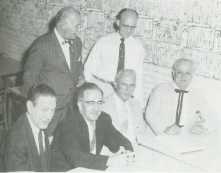 |
Home | Search | Browse | About IPO | Staff | Links |
 |
Home | Search | Browse | About IPO | Staff | Links |
 The Executive Director of the Illinois Municipal League recently met with several municipal officials in southern Illinois, to discuss proposed legislation. Pictured above, standing, left to right: A. L. Sargent, Executive Director of the League; Mayor William Cunningham, Pinckneyville; seated, left to right: Mayor J. K. Williamson, Nashville; Mayor H. B. Blanchard, Centralia; Mayor Cecil Smith, Vandalia, and Mayor Paul E. Zeeb, Greenville. _______________________________________________________ Evidence resulting from use of radar is admissible in criminal prosecution of a motorist in Illinois unless the motorist objects, in which case proper foundation for its admissibility must be laid, Attorney General Latham Castle has advised State's Attorney John C. Friedland of Kane County. No decisions upon such use of radar have been rendered by Illinois courts, Castle's opinion said, but many such cases have been passed upon in other states. Such decisions in other states, Castle's opinion said, "support the proposition that the courts will now take judicial notice of the scientific soundness and accuracy of radar as a device for measuring speed in criminal prosecutions." "However, since Illinois is not noted among" the jurisdictions that so hold or indicate this position," Castle's opinion said, "it may well prove more sound and safer to introduce expert foundation testimony as to the accuracy of radar devices, at least until an appellate court of this state holds it unnecessary. In the final analysis, law enforcement officers and the prosecution should exercise a sound discretion based on the particular circumstances obtaining in each particular case." _______________________________________________________ So far this year, Milwaukee, Wis., has ordered the demolition of hundreds of slum buildings whose owners had not complied with laws setting standards for structural soundness, plumbing, heating, ventilation, and the like. "If the city had had to pay for the razed buildings under a land purchase plan ... it simply could not have afforded a program of this type," said Frank P. Zeidler, mayor of Milwaukee. "As a result of this experience," he added, "I am thinking of asking the state legislature to give us a stronger condemnation law." This is one of the first instances of practical application of a theory long advocated by some authorities in the slum clearance and redevelopment field, according to the National Association of Housing and Redevelopment Officials. The theory is, in brief, that when a city is preparing to clear a slum area, and there are houses so structurally unsound and unsafe that they cannot be repaired, the city should not have to buy them and pay for having them removed. These houses violate the health and safety laws, and the owners should have no claim on public funds for the loss of income they suffer when illegal houses come down. What Milwaukee has done is to order slum property demolishedówith the cost to be borne by the owneróbecause it violates the health and safety laws. In this instance, the city is acting under the police poweróthe power to protect the well being of its citizens. Use of this power does not require the payment of compensation.
|Home|
|Search|
|Back to Periodicals Available|
|Table of Contents|
|Back to Illinois Municipal Review 1956|
|